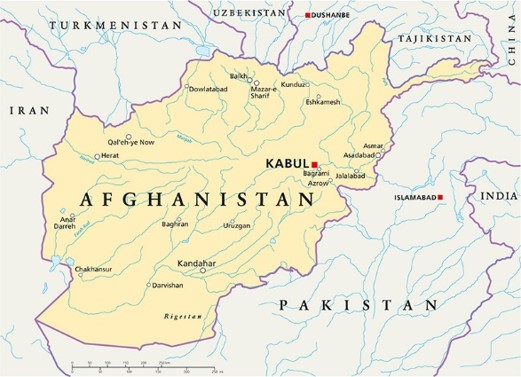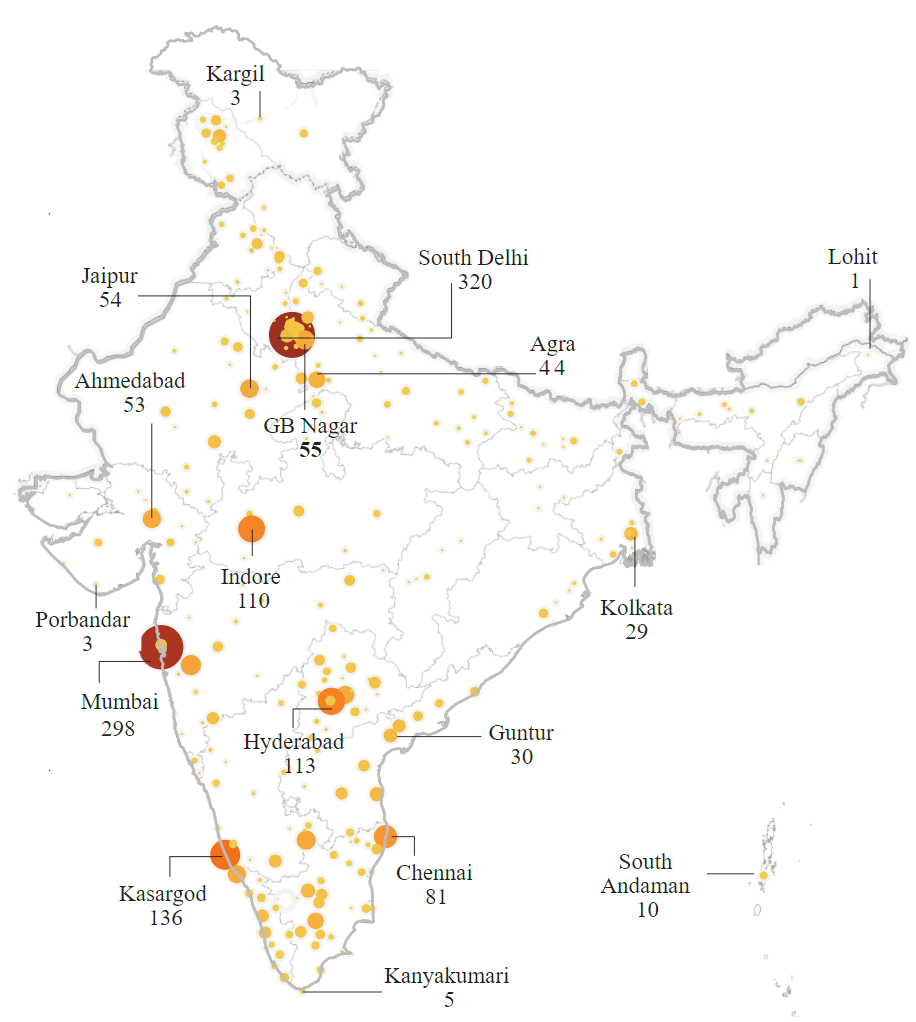Daily Current Affairs and GK | 09 April 2020

Happy February get 35% Off
Use Coupon code FEB26
1. Indian Railways started 109 parcel trains on 58 routes
- Recently, Indian Railways has introduced 109 scheduled parcel trains for smooth movement of essential goods.
- Through them, the availability of essential commodities for common people, industries and agriculture will be easily available.
- Also, it will be possible to deliver essential goods to almost all the important cities of the country rapidly.
- These parcel trains are arranged according to customer demand.
- Apart from Delhi, Mumbai, Kolkata, Chennai, Hyderabad and Bengaluru, essential commodities will be provided to Guwahati also.
- Indian Railways:
- India has a national railway system operated by the Ministry of Railways. It is one of the public facilities provided by the government.
- It has the fourth largest railway network in the world with a length of 67,368 km as of March 2017.
- It was founded on 16 April 1853.
- Its headquarters is located in New Delhi.
2. Learning platform launched by the Central Government
- Recently, the Central Government has launched a learning platform for training and keeping health workers and workers updated to deal with the COVID-19 pandemic.
- The name of this learning platform is iGOT platform (igot.gov.in).
- On this platform, doctors, nurses, paramedics, health workers, technicians, auxiliary nursing midwives (ANM), Central and State Government officials, National Cadet Corps personnel, Nehru Yuva Kendra Sangathan, Indian Scouts and Guides and Indian Red Cross Society workers will be able to get training and information.
3. Government decided to immediately issue pending income tax refunds up to Rs 5 lakh
- Recently, the Government of India will issue pending income tax refunds up to Rs 5 lakh immediately.
- In view of the situation of the COVID-19 pandemic, the government has taken this decision with the aim of providing immediate relief to taxpayers and traders.
- This decision of the government will benefit about 14 lakh taxpayers.
- This will benefit about one lakh small businesses including micro, medium and small enterprises.
- Thus the total amount to be refunded would be around Rs 18,000 crore.
- The government has also decided to immediately release the amount of all pending GST and customs refunds.
- Income tax is a type of direct tax, which is recovered by the Income Tax Department.
- The Income Tax Department is a government agency that undertakes direct tax collection.
4. Necessary medicines are being delivered at the doorstep of patients and the elderly to fight COVID-19 through Pradhan Mantri Jan Aushadhi Kendra
- Essential services and medicines are being delivered at the doorstep of patients and the elderly under the Pradhan Mantri Bhartiya Jan Aushadhi Pariyojana Scheme to fight the COVID-19 pandemic by pharmacists through Pradhan Mantri Jan Aushadhi Kendras.
- Pharmacists at these centers are expanding essential services by providing quality generic medicines at affordable prices to the common people of the country.
- At present, more than 6,300 Pradhan Mantri Jan Aushadhi Kendras are functioning in 726 districts of the country.
- Citizens can use the Jan Aushadhi Sugam app to find out the availability of their nearest centers and medicines.
- Pradhan Mantri Bhartiya Jan Aushadhi Pariyojana:
- Pradhan Mantri Bhartiya Jan Aushadhi Pariyojana is a campaign launched by the Department of Pharmaceuticals.
- Under this, Pradhan Mantri Jan Aushadhi Kendras have been opened across the country.
- In India, quality medicines are made available to the public through these specialized centers at affordable prices.
5. SIDBI will provide emergency working capital to MSMEs
- Small Industries Development Bank of India (SIDBI) will provide emergency working capital up to Rs 1 crore to small and medium enterprises.
- This amount will be different from the orders given to them by the government.
- SIDBI Assistance to Facilitate Emergency response against the coronavirus- SAFE PLUS will be given within 48 hours with no collateral.
- An interest rate of 5% will be levied on this loan amount. SIDBI has increased the limit of safe loans announced a few days ago from Rs 50 lakh to Rs 2 crore.
- The amount will be provided to MSMEs engaged in the manufacture of hand sanitizers, masks, gloves, head gear, bodysuits, shoe-covers, ventilators and goggles used in handling COVID-19.
- Small Industrial Development Bank of India (SIDBI):
- There is a development financial institution in India, with offices located across the country.
- Its headquarters is located in Lucknow, Uttar Pradesh.
- It was established on 2 April 1990.
- Mohammad Mustafa is the Chairman and Managing Director of SIDBI.
6. CSIR, CCMB and IGIB together work on genome sequencing of coronaviruses
- Recently CSIR Center for Cellular and Molecular Biology (CCMB), Hyderabad and Institute of Genomics and Integrative Biology (IGIB), New Delhi started working together on whole genome sequencing of novel coronaviruses.
- Genome sequencing will help scientists understand the evolution of viruses.
- Also, it will help them to know how fast it develops and what are its future aspects?
- For this, the National Institute of Virology (NIV) in Pune has also been asked to provide samples of the virus.
- Genome sequencing:
- Genome sequencing is a process of finding the complete DNA sequence of an organism's genome at a time. It is the sequencing of the chromosomal DNA of an organism as well as the mitochondrial DNA. In the case of plants, it indicates the sequencing of DNA present in chloroplasts as well.
7. Afghan government released 100 Taliban prisoners
- Recently the Afghan government has released 100 Taliban prisoners.
- The freed prisoners have been selected on the basis of their health, age and the duration of remaining imprisonment.
- The Afghan government has taken this decision under the Taliban-US peace talks and given the proliferation of COVID-19.
- Afghan officials have said that they are also considering releasing 10,000 non-Taliban prisoners to reduce the spread of coronaviruses in prisons.
- Afghanistan:
- Afghanistan is a country located at the confluence of Western, Central and Southern Asia.
- Its capital is Kabul and the currency is Afghan Afghani.
- Ashraf Ghani is the President of Afghanistan.

8. Increase in cases of corona virus infection in the country
- Recently, a review has been conducted on the condition of corona infection in the country between 23 March and 8 April.
- During this review, it has been found that there has been an increase in cases of corona virus infection in the country.
- For this reason, the more sensitive area in the country has been identified as a hotspot.
- As of 8 April, at least one case of COVID-19 has been found in 284 Indian districts across the country. About 15 days ago, till March 23, there were only 84 such districts in the country.
- South Delhi recorded an increase of 316 cases during this period, the highest among all districts, followed by Mumbai (278 more cases) and Kasargod (121 more cases).

(Source: The Hindu)
Topic of the Day-“Ordinary Bill V/s Money Bill”
Four types of Bills are described in the Indian Constitution:
1. Ordinary Bill (Articles 107 and 108)
2. Financial Bill (Article-117-1, 117-3)
3. Money Bill (Article-110)
4. Constitution Amendment Bill (Article-368)
Money Bill - Article 110 of the Indian Constitution defines Money Bill. Money bills are concerned with financial matters like taxation, public expenditure etc. The Lok Sabha speaker decides whether a bill is a money bill or not.
Ordinary Bill - Apart from matters related to money, all other matters fall under the Ordinary Bill. They are described in Article 107 and Article 108 of the Indian Constitution.
Difference between ordinary bill and money bill:
- Money Bill can only be introduced in Lok Sabha. Whereas the Ordinary Bill can be introduced in any House.
- Money Bill is introduced only by the recommendation of the President. The President's recommendation is not required in the case of Ordinary Bill.
- The Rajya Sabha cannot amend or reject a Money Bill. Whereas in the case of an ordinary bill, the Rajya Sabha has the same powers as the Lok Sabha.
- The Rajya Sabha can retain the money bill with itself for only 14 days. In case of an ordinary bill, the Rajya Sabha can retain it for about 6 months.
- There is no provision for a joint sitting for the Money Bill. Whereas, in the case of an ordinary bill, there is a provision for joint sitting.
- If the Money Bill is not passed in the Lok Sabha, then the entire Council of Ministers has to resign. But there is no such provision for an ordinary bill.
Multiple Choice Questions (MCQs)
1. Indian Railways was established in which year?
A. 1857
B. 1853
C. 1957
D. 1947
2. The Central Government launched a learning platform to deal with the COVID-19 pandemic, which of the following will be trained by this platform?
A. State government officials
B. Workers of Indian Red Cross Society
C. National Cadet Corps
D. All of the above
3. What type of tax is income tax?
A. Indirect
B. Direct
C. Both A and B
D. None of the above
4. Which department is running the Pradhan Mantri Bhartiya Jan Aushadhi Pariyojana?
A. Health Department
B. Department of Pharmaceuticals
C. Public Welfare Department
D. Revenue Department
5. Where is the headquarters of the Small Industrial Development Bank of India (SIDBI) located?
A. Mumbai
B. New Delhi
C. Kochi
D. Lucknow
6. Where is the National Institute of Virology located?
A. Kolkata
B. Chennai
C. Hyderabad
D. Pune
7. Ashraf Ghani is the President of which country?
A. Qatar
B. Bahrain
C. Afghanistan
D. Tajikistan
8. Which region in the country has witnessed the highest increase in corona infection in the period from 23 March to 8 April?
A. Mumbai
B. South Delhi
C. Kochi
D. Madurai
Solution:
1. B
2. D
3. B
4. B
5. D
6. D
7. C
8. B





 8 April 2020 Current Affairs
8 April 2020 Current Affairs 








Comments